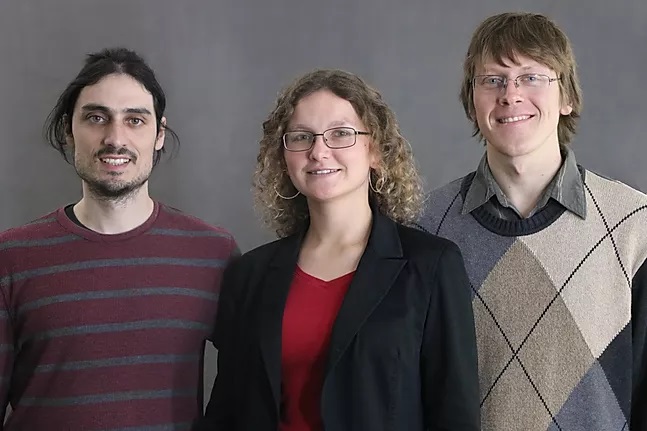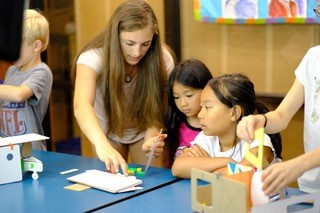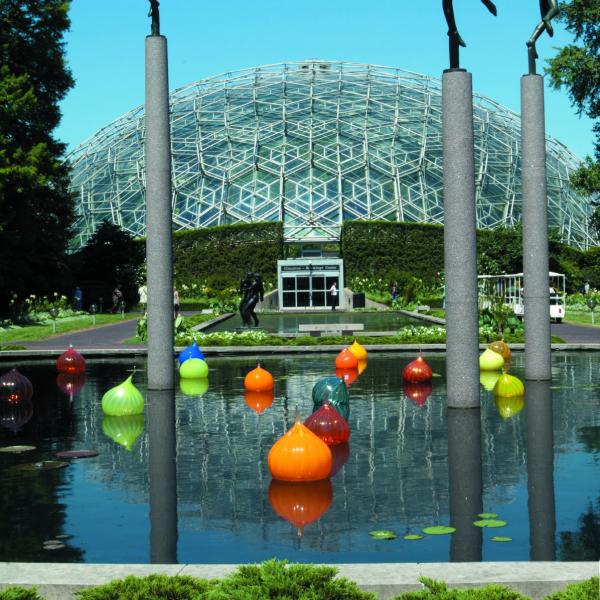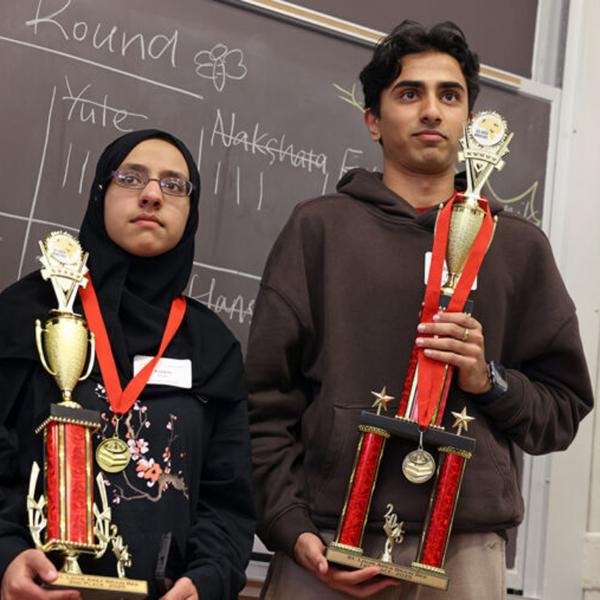The founders of three start-ups discuss their journeys from Arts & Sciences to entrepreneurship. The businesses are finalists for the 2020 Global Impact Award.
Washington University's Skandalaris Center for Interdisciplinary Innovation and Entrepreneurship has recognized six start-ups across the university as finalists for its $50,000 Global Impact Award, which supports “scalable, sustainable, and quick-to-market” ventures with “proof of concept and a broad impact.” The winner will be announced April 15.
Whether they focus on growing food sustainably, building interactive STEM curricula, or helping people find tech jobs, the finalists from Arts & Sciences all share the goal of improving people’s lives in St. Louis and beyond.
Engine 2 Photonics

Founded in June 2018 by Benjamin Wolf, Zuzana Kocsisova, and Rafael Saer, Engine 2 Photonics produces LED lights for both individuals and businesses to grow food crops indoors. The three met at Washington University, where Wolf was completing a doctorate in plant science, Kocsisova was completing a doctorate in molecular genetics, and Saer was a postdoctoral researcher of photosynthesis.
Using their own houseplants as guinea pigs, the trio developed a USB-powered grow light that enables the rapid production of healthy food with a lower cost and smaller carbon footprint than food grown in vertical farms or shipped across the country. Compared to growing plants outside, “We can use a twentieth or less water,” said Wolf. “We can make plants that grow twice as fast or even faster depending on the conditions.”
“That's just because they're not ever getting frozen,” Kocsisova added. “They're never getting dried out. They get light for as long as they need. They don't have to deal with short days in winter.”
Another advantage offered by indoor grow lights is the flexibility to tailor the light spectrum to the needs of the plant. For example, growing lettuce under blue and ultraviolet light encourages the production of antioxidants, which makes the resulting produce more nutritious for humans.
“If you think about when you're in sunlight and you get UV light and blue light hitting you, you tan, that's your body's way of protecting against UV,” said Kocsisova. “When plants get these colors of light hitting them, the chemicals they make to protect themselves are antioxidants. You see the red lettuce varieties turning a nice bright red.”
In addition to a consumer product launched on KickStarter, the team creates custom lighting for greenhouses and restaurants in the St. Louis area. Vin de Set, Eleven Eleven Mississippi, and Hamilton’s Steakhouse are among the local restaurants that serve salads grown using Engine 2 Photonics’ lights.
Wolf says that the expertise he and the others gained during their time in Arts & Sciences and the BioEntrepreneurship Core student group set the foundation for their success with Engine 2 Photonics. “Rafael and I are both photosynthesis researchers by trade, and both of us had to work with electronics and LEDs for our PhD work,” he explained.
Looking to the future, Wolf hopes that the business “will grow and help the St. Louis area and the rest of the country to produce healthier, safer, and more local greens and other vegetables. Our goal is to make sure that everybody has access to really good, healthy local food, because right now that's kind of tough to find in a lot of cases.”
3DuxDesign

With her company’s architectural modeling system, Ayana Klein has designed engaging STEM modeling kits for elementary and middle school students, developed a web-based learning platform, and launched a global initiative to provide classrooms with her products — all before finishing her sophomore year at Washington University.
Inspired by a childhood of creating homemade gifts out of cardboard, Klein and her younger brother Ethan designed a modeling system with six uniquely shaped connectors and geometric cardboard forms with the goal of bringing creativity into the classroom.
“I believe that real-world application problems and hands-on projects allow all types of learners to understand what they are learning and why,” said Ayana Klein. “This is what will help them remember their education for when they enter the real world.”
Klein intentionally creates her modeling kits without pre-set rules and instructions so that kids can “learn to improvise, experiment, fail, reexamine, and succeed,” she explained. Each of the design challenges “are based on design thinking and engineering concepts with a focus on community, communication, empathy, and creating a sustainable world.” The kits include cardboard pieces of various shapes, small plastic connectors, and lesson plans to channel students’ creativity into meaningful STEM learning.
In partnership with global leaders in diverse fields, Klein created 3DuxUniversity, an online community where students can share their projects and collaborate with others. For example, students might design a local power grid, envision a bridge to cross a German river, or investigate ways to protect bees in New York City. Last summer, Klein brought her company’s curriculum to classes in a dozen countries, and she hopes to continue expanding her impact.
Klein has taken advantage of her first two years at WashU to explore a variety of fields across Arts & Sciences. She has yet to declare a major, but her main areas of interest are education and entrepreneurship.
Klein says that 3DuxDesign is just getting started. “Over the next few years, we would like to continue to grow our business by expanding our curriculum to a greater number of schools and a larger variety of age groups. We would also like to ultimately enter the toy retail industry.”
Tech Jobs for Good
For people who seek to use their tech skills to address social and environmental issues, searching for jobs can prove frustrating, especially without a convenient way to discover organizations that fit their values. When he found himself in this situation, Noah Hart created a website to highlight such organizations and help other job seekers find meaningful opportunities.
After graduating from WashU in 2013 with a major in anthropology and a minor in learning sciences, Hart worked at a social impact tech startup where he became engaged with the startup community and learned what it would take to start a company of his own.
Hart founded Tech Jobs for Good in 2018 and has been working on it full-time since April 2019. So far, over 2,000 jobs have been posted on the site, ranging “from criminal justice reform to improving access to quality education and addressing climate change,” he explained. “I aim to help these organizations tackling these issues increase their capacity and therefore increase their impact as well as cultivate a community of talented people who want to work in this area.”
Organizations who want to post jobs on the site must demonstrate how they fit in with one of nine impact categories and “how they benefit the community in addition to their stakeholders.”
Hart sees his liberal arts background as an important asset in his journey as an entrepreneur. “I believe that my anthropology degree gave me a lot of helpful frameworks for thinking about human behavior and the critical thinking skills needed to navigate complex and ambiguous systems,” he said. “It has helped me feel comfortable learning new things quickly, which has been helpful as a founder of a small company.”
As he expands his website’s reach, Hart hopes to build a team sharing his vision of using tech to make a positive impact on the world.
“I hope that Tech Jobs for Good can help lots of people find work that they find personally meaningful and aligns with their values.”




